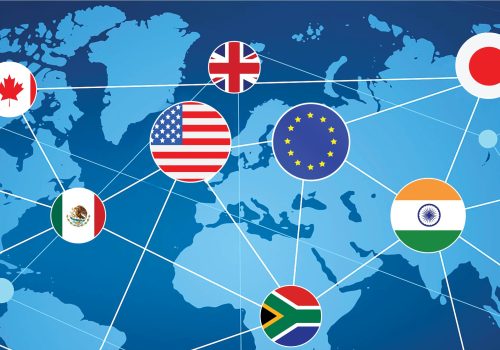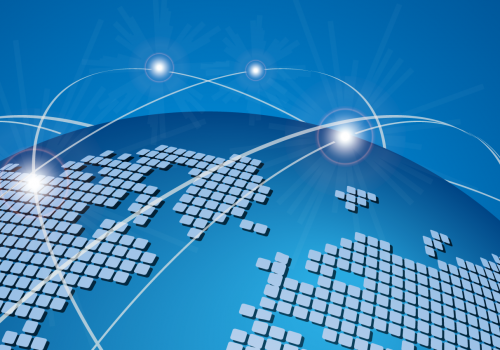Toward a Democratic Technology Alliance: An innovation edge that favors freedom
This is the fourth report in a five-part series of Atlantic Council publications, as part of a project on revitalizing the rules-based international system and positioning the United States and its allies to succeed in an era of strategic competition.
The first publication, Present at the Re-Creation: A Global Strategy for Revitalizing, Adapting, and Defending a Rules-Based International System, sets forth an overarching global strategy for the United States and its allies to uphold the rules-based system by strengthening cooperation among the world’s democracies, while seeking to cooperate with other glob
The second report, From the G7 to a D-10: Strengthening Democratic Cooperation for Today’s Challenges, proposes the creation of a new D-10 core group of influential democracies across North America, Europe, and the Indo-Pacific, aimed at deepening strategic collaboration on the most pressing challenges facing the rules-based order.
The third report, An Alliance of Democracies: From Concept to Reality in an Era of Strategic Competition, suggests that an Alliance of Democracies could foster cooperation among a larger group of nations committed to shared values and goals, potentially as a standing body stemming from the Biden administration’s series of democracy summits.
This report calls for a Democratic Technology Alliance that would ensure that the free world prevails in the race for advanced technologies by jointly investing in innovation, countering unfair practices, and developing rules and norms consistent with democratic values.
The fifth and final report, A Democratic Trade and Economic Partnership: Ally Shoring to Counter Coercion and Secure Supply Chains, proposes an integrated framework for leading democracies and other partners to reduce strategic dependency on revisionist autocracies, coordinate on economic challenges, and foster free, fair, and secure trade.
I. Executive summary
Following World War II, the United States and its democratic allies established and defended a rules-based international system. This system was expanded and deepened after the end of the Cold War. Despite its shortcomings, it has proven unmatched in its ability to deliver peace, prosperity, and freedom to the United States and much of the world. The global order, however, is at an inflection point. It is being confronted by revisionist autocratic powers — China and Russia — and, at the same time, contending with a range of other challenges, from emerging and disruptive technologies to climate change to a lack of confidence in open-market democracy.
The rules-based system has been successful in ways that its founders could not have imagined. But, as the authors of this report have set forth in a series of related publications, this system must be revitalized and adapted for a new era. Inclusive institutions, including the United Nations (UN), have been limited in their effectiveness, in part because of obstruction by autocracies that systematically violate key tenants of the rules-based system. New institutions are needed that bring together powerful and likeminded democracies – those that are willing to play by certain rules and use their collective influence to positively shape the future of the system.
Such an approach is particularly necessary to address the challenges of emerging technologies. The world is experiencing a Fourth Industrial Revolution (4IR). An array of new technologies are being simultaneously developed and advanced, such as artificial intelligence (AI), quantum computing, synthetic biology, additive manufacturing, fintech, and robotics. As with previous advances, these new technologies off er great promise but also threaten serious downside risks. Fire can fuel stoves and keep people warm, but it can also be used to torch villages. Similarly, AI algorithms can be employed to run efficient smart cities of the future, but can also guide lethal and destructive autonomous weapons systems. The central question is how can the United States and its allies harness these advanced technologies for good while successfully managing their potential dangers?
Among the greatest challenges in the area of technology are those posed by China. As it acts to challenge the rules based international system, Beijing is pursuing a systematic effort to win the race for advanced technologies, and it appears to be leading in several key areas. China has invested heavily in research and development in advanced technologies, from AI to quantum computing to hypersonic missiles, while also gaining advantages through unfair practices, including the widespread theft of intellectual property (IP).
China’s increasing capabilities in the technology realm pose significant risks for the United States and its democratic allies and partners. These risks are evident across three main areas: defense and national security, economics, and values. Beijing is using its increasingly advanced technological capabilities to develop more sophisticated weapons systems. China’s leadership in advanced technologies could help fuel its economic growth and render much of the world dependent on it for critical technologies. Beijing is also employing new technologies in ways that are inconsistent with democratic norms, such as facial recognition technology to assert greater surveillance of its citizens, and is exporting these technologies to other autocracies.
To be sure, not every aspect of China’s role in developing advanced technology is cause for concern. Efforts by Chinese scholars to develop AI for medical diagnostics, for example, could constructively advance scientific knowledge and provide health benefits for people around the world. The challenges posed by China and other autocracies, including Russia, stem from their disregard of international norms and systematic attempts to undermine key elements of the rules-based order.
The nation or group of nations that are first to develop and harness the technologies of the 4IR will enjoy a sustained economic, military, and geopolitical advantage. The first three industrial revolutions originated in the West and helped propel democracies to a position of global leadership that has lasted for several centuries. If leading democracies are able to maintain their technological edge, they will be well-positioned to sustain their geopolitical, economic, and military advantages and uphold the rules-based international system. If, on the other hand, the Chinese Communist Party (CCP) succeeds in deploying advanced technologies ahead of the democratic world, it will be in a much stronger position to advance a China-centric system that is more consistent with its autocratic values. Indeed, the strategic competition between democracy and autocracy may ultimately be decided in the technological domain.
For the United States to prevail in this competition, it must successfully harness the technologies of the Fourth Industrial Revolution. But to compete effectively, the United States cannot act alone. It must work closely with democratic allies and partners to leverage shared capabilities and resources, and implement joint strategies and policies that are strategically aligned. Several efforts have been initiated to help strengthen democratic cooperation on the technologies of the 4IR, including through the G7, the Quad, and the US-EU Trade and Technology Council. However, while valuable, these efforts have been limited in geographic and technological scope. What is missing is an integrated framework for technology cooperation that brings together leading democracies to advance a holistic, coherent, and effective set of strategies across a range of domains.
The nation or group of nations that are first to develop and harness the technologies of the Fourth Industrial Revolution will enjoy a sustained economic, military, and geopolitical advantage.
The United States and leading democracies across North America, Europe, and the Indo-Pacific should establish a new Democratic Technology Alliance (DTA). Bringing together the world’s most technologically advanced democracies, such an alliance would foster cooperation across a wide range of the most critical and emerging technologies, including AI, quantum, 5G, biotech, semiconductors, nanotechnology, hypersonics, and others.
The DTA should focus on three major lines of effort. First, it should strengthen innovation ecosystems in the free world through joint research and development, increased data sharing, and forging a common approach to technology regulation. Second, it should limit China’s unfair technology advantages by developing common approaches to investment screening, IP theft, export controls, outbound investment, and cybersecurity. Third, the DTA should follow a two-track path for establishing global technology norms: seeking agreement on rules and norms among leading democracies, while also seeking to engage autocratic powers from a unified position of strength to negotiate a more inclusive set of global norms.
Through a new technology alliance, the United States and its allies can work together to ensure that democracies maintain their technological edge and foster new technologies in a manner consistent with democratic values, while acting to uphold the rules-based international system.



